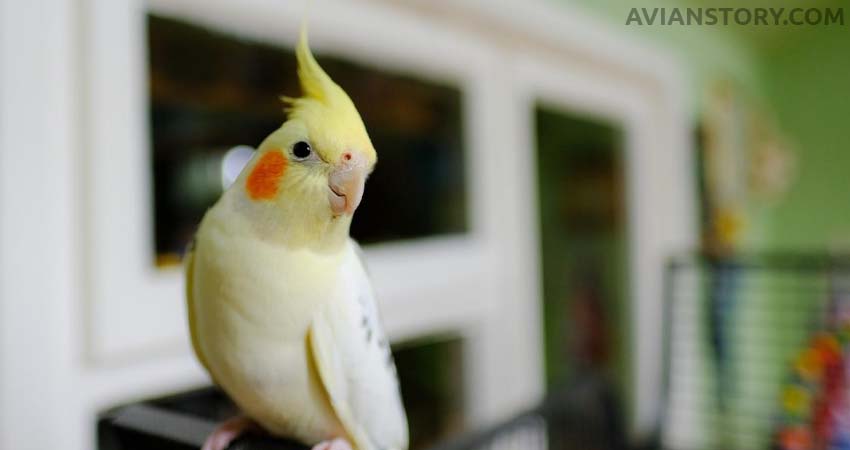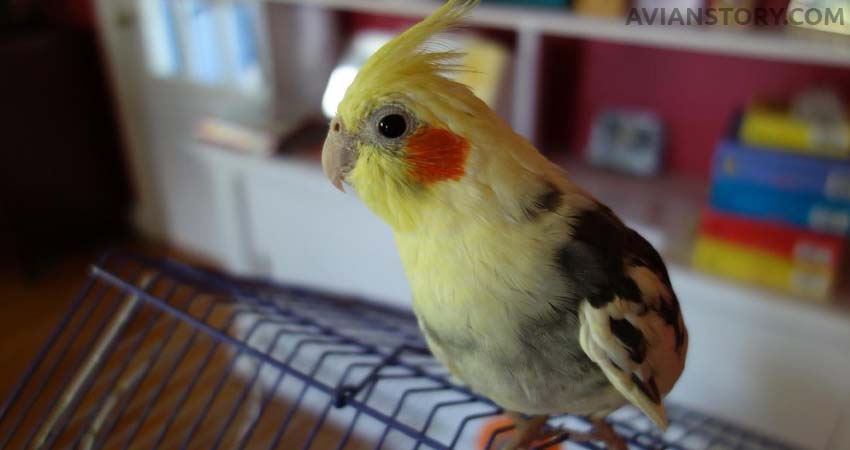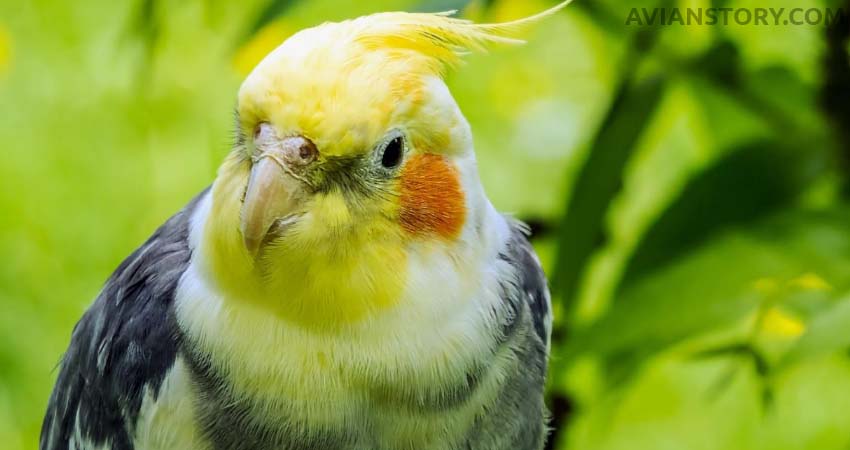Why Is My Cockatiel Sneezing? Should I Worry?
Cockatiels, like other animals, dry sneeze occasionally to clear their airways. A dusty or too-dry atmosphere can also cause them to sneeze. But since sneezing could be a sign of underlying health conditions like respiratory disease, you can’t take it lightly.
So it’s worth wondering, “why is my cockatiel sneezing?” Dust from their powder-down feathers, dry weather, and smoke or fumes are the primary reasons a cockatiel sneezes. If your cockatiel sneezes frequently or it’s accompanied by nasal discharge or other illness symptoms, take it to the vet immediately.
Whether it’s a sickness or just the dry & dusty atmosphere, you’ve got to be proactive and do whatever is needed to get your bird rid of this condition. Find out everything about why your cockatiel sneezes and how to help!
Why Is My Cockatiel Sneezing? Environmental Causes & How You Can Help

If your cockatiel sneezes without any nasal discharge or other sign of illness, it’s probably sneezing due to an environmental reason.
The table below depicts some of these reasons and the related signs.
| Reason | Symptoms |
| Dust & powder in the feathers entering nares | Dry sneezing once or twice a day |
| Dusty atmosphere, fumes, or harsh chemicals used around | Tends to sneeze frequently when cleaning going around the cage |
| Staying in dry air for too long | Dry sneezing occasionally due to dried cilia of the nasal passages |
These natural or environmental reasons behind your bird’s sneezing are generally easy to deal with. Let’s look at how you can help a cockatiel when it sneezes for any of the above reasons.
Dust & powder in the feathers entering the nares
The powder-down feathers close to the skin break down into a white powder, much like the dandruff that human hairs have. Cockatiels produce excessive powders that can get into their nares, causing them to sneeze.
The powder helps improve the efficiency of their flock, prevent heat loss, and make the feathers silky and soft. Cockatiels produce these powders by frequent preening. Due to these white flakes, your cockatiel could be sneezing once or twice a day.
If it’s more frequent, you need to investigate it further to find the causes. Giving them regular baths is the best way to keep their dander down to a minimum. Misting them with a spray bottle every now and then can also help reduce the dust.
You can visit a vet who’ll probably use nasal saline to clean the debris. Since warm temperatures can increase the powdering rate, make sure your cockatiel stays in a mild temperature (around 70 to 80F).
Harsh Chemicals or Household Hazards
Cockatiels are extremely susceptible to smoke and harsh chemicals. Smoke or fumes coming from any of the below sources can affect your bird’s respiratory system, causing it to sneeze.
- Smoke coming from cigarettes
- Fumes produced while cooking
- Gases like carbon monoxide
- Fumes coming from cleaning agents, varnishes, paints, or other household items
Since they can affect your bird’s respiratory system and make it sneeze unusually, you should make sure the cockatiel isn’t exposed to any of such smoke or fumes.
Use natural cleaners like vinegar solution around your bird’s cage. Also, place your bird’s cage in a smoke-free position.
Staying in Dry Air for Too Long
Since parrots come from naturally humid weather, dry winter weather can create some issues. If the humidity falls below 40%, it may leave your cockatiel’s nasal passages dry and irritated, causing it to sneeze more frequently.
In such a case, consider adding a humidifier to your bird’s room. If you can’t add a humidifier, spray them with lukewarm water. The vitamin A-rich diet can also help your cockatiel deal with issues caused by dryness.
Sometimes, cockatiels sneeze when air doesn’t pass through their cage and clear away the debris around them. So keep the cage in a place where air circulates through it.
Cockatiels’ Diseases Associated with Sneezing: When You Need to Worry?

If you notice the frequency of sneezing has increased in your cockatiel, it could possibly be associated with a disease. Before you run to the vet, you need to know what are some of the illnesses associated with sneezing and what their symptoms are.
Sinus infection or nasal blockage
Your cockatiel is susceptible to rhinitis or sinusitis. Besides, their nasal passages may be blocked due to sinus infection. It’s often associated with symptoms like excessive sneezing, nasal discharge, and watery or swollen eyes.
These are typically caused by bacterial infections and require immediate medical attention. The vet will diagnose your bird and start antibiotic treatment immediately to improve the condition.
Developing Cold
Cockatiels can easily develop a cold. Sneezing is a symptom that could tell you whether or not they’ve caught a cold.
If their respiratory system is affected, sneezing will be accompanied by some other symptoms, such as nasal discharge, coughing, runny eyes, respiratory distress, abnormal breathing, and more.
To treat cold in cockatiel, you need to take it to the vet immediately. Make sure the cage is always heated to help the birds return to their normal temperature quickly. Also, provide a balanced diet consisting of fruits and vegetables that can boost their immunity.
Respiratory Tract Diseases
Respiratory tract diseases are a serious condition that a cockatiel can develop when bacteria or virus infects their air sacs or lungs.
Some of the lung/airway disorders that the cockatiel could get affected with include Aspergillosis, Bird flu (avian influenza), respiratory tract infection, respiratory disease, etc.
Sneezing could be an indicator of such a respiratory disorder if it’s accompanied by the following symptoms:
- Wheezing, a whistle-like sound that’s high pitched and indicates breathing difficulty
- Discolored feathers around the beak due to excessive sneezing
- Increased breathing effort characterized by the bird’s tail bobbing with every breath
- Thick nasal discharge
- Breathing with mouth opened
- Coughing
- Red nostrils
- Loss of appetite and weight
- Lethargy
Rush to the vet immediately as delayed treatment can put your bird’s life in danger.
Other Reasons Why Your Cockatiel May Be Sneezing
Other possible reasons why your cockatiel may be sneezing or suffering from a runny nose include:

Food Particles Getting into the Nostrils
Like dust and debris, food particles can also be stuck in your cockatiel’s nostrils, causing them to sneeze more often. And you can ascertain that if your bird sneezes after feeding.
Flushing the bird’s nostrils using saline water is an effective way to clear all the foreign particles from their nasal passage. Check out the video to know more about it.
Lack of Vitamin A
If your cockatiel is suffering from vitamin A deficiency, it’ll eventually have lowered respiratory tract immunity. As a result, you’ll be watching symptoms like sneezing, wheezing, plugged nostrils, or thick nasal discharge.
So make sure your bird gets enough vitamin A. Consider red/orange fruits or vegetables, such as papaya, carrots, squash, sweet potatoes, etc. You can also consider green leafy vegetables and beta-carotene supplementation to prevent unusual sneezing.
How to Prevent Unusual Sneezing of Your Cockatiel
To prevent your cockatiel from frequent or abnormal sneezing:
- Ensure the right humidity (around 60%) and temperature (70 to 80F) in their room and cage
- Spray lukewarm water to keep your cockatiel moist
- Clean their room and cage at least twice a week
- Give them a bath at least twice a week to reduce feather dust
- Keep their cage away from the kitchen and make sure enough fresh air passes through their cage
- Don’t smoke or use any chemical agent that releases fume in the atmosphere
- Flush their sinuses once a while when visiting the vet for routine checkups
- Start treatment immediately if diagnosed with other severe illness symptoms
FAQs
Here we’ve addressed some of the most common queries on the topic.
Should I worry if my cockatiel sneezes?
Dry sneezing that occurs once or twice a day is absolutely normal for a cockatiel. But if it’s more frequent than that or accompanied by nasal discharge, watery eyes, or any other such symptoms, then you’ll have to take it to the vet. Check this video to see how a cockatiel usually sneezes.
Can tumors cause excessive sneezing in cockatiels?
Yes, tumors in cockatiel’s nasal cavities can cause the cockatiel to sneeze excessively. It will require surgical removal to cure it.
Final Words
Why is My Cockatiel Sneezing? Like humans, cockatiels sneeze for many reasons. Since they’re dusty birds you can expect them to sneeze once in a while. So infrequent dry sneezing is rather healthy as they help clear your bird’s airways.
But if it’s frequent and you see symptoms like nasal discharge, runny eyes, respiratory distress, etc.; rush to the vet immediately. Also, ensure your cockatiel gets a regular bath, suitable temperature and humidity, a dust-free atmosphere, and a vitamin-A-rich diet to deal with excessive or unusual sneezing.
